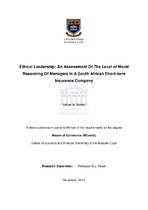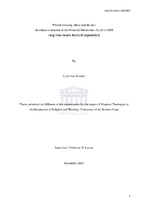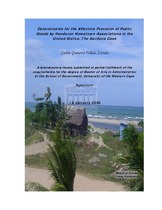Ethical leadership: an assessment of the level of moral reasoning of managers in a South African short-term insurance company
Abstract
Against the background of major corporate scandals internationally and in South Africa, questions are being asked about the level of morality of leaders in organisations. This study assessed the level of moral reasoning of senior managers in a South African company in the insurance industry. The study was based on Kohlberg’s Cognitive Moral Development (CMD) Theory and an assessment of key literature pieces relating to ethical leadership and business ethics. Research has demonstrated that ethical leaders have a significant influence on an organisation’s performance, reputation, sustainability, ethical climate and employee engagement. Globally and in the South African corporate context it is therefore important
for organisations to understand the capacity of its leaders to behave ethically so that appropriate interventions can be engaged in. More specifically, this study aimed to assess the level of moral reasoning of managers in a large South African organisation and examined the relationship between the variables age, gender, race, tenure and education on the one hand and the level of moral reasoning on
the other hand. This study also assessed the reliability of the Managerial Moral Judgment Test (MMJT). This study was a cross-sectional, quantitative study utilising a previously developed questionnaire, the Managerial Moral Judgment Test.
This study contributed to the very sparse body of knowledge of managerial moral reasoning in the South African business context, while the research results can be used to identify managerial training and development needs in ethics in the organisation studied. This study found that the moral reasoning levels of managers at the research site, is at the conventional level, while the variables age, gender, race, tenure and education have no significant influence on the level of moral reasoning. In addition, this study established the internal reliability of the Managerial Moral Judgment Test and located ethical leadership and business ethics in the literature.
Collections
Related items
Showing items related by title, author, creator and subject.
-
Fear of crime, place and the moral order: A secondary analysis of gated communities
Riddles, Alton (University of Western Cape, 2019)This study will use secondary data analysis of academic articles to study the topic under question. Much has been written on fear of crime from a quantitative and to a lesser extent qualitative approach (Burgess and Doran ... -
Whistle blowing, ethics and the law: an ethical evaluation of the Protected Disclosures Act 26 of 2000 using Hans Jonas’s theory of responsibility
October, Lydia Joy (University of the Western Cape, 2015)South Africa has progressed towards the realisation of an expressive culture of disclosure. Significant implementation and enforcement of the Protected Disclosures Act (26 of 2000 – hereafter referred to as “the Act” or ... -
Determinants for the effective provision of public goods by honduran hometown associations in the United States: the Garífuna case
Zavala, Carlos Gustavo Villela (2006)The study concludes that the existence of HTAs in the USA is explained by the socially enforced institution of the hijos del pueblo (sons of the town) having a duty to help their hometowns, as well as the private benefits ...




